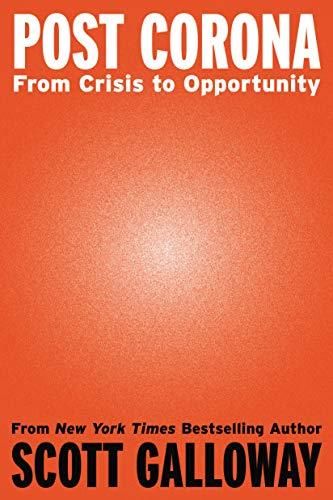Marketing professor Scott Galloway offers his knowledgeable, rowdy take on how the pandemic is changing, has already changed and will continue to change the US economy and its components.

Viral Virus Disruption
Scott Galloway, professor of marketing at NYU’s Stern School of Business, founded nine companies and served on the boards of The New York Times Company, Urban Outfitters and UC Berkeley’s Haas School of Business. He draws on this considerable experience to bolster his contention that the coronavirus pandemic hit the fast-forward button on a range of business and social trends.
He finds that certain indicators reached landmarks that would have taken 1o years to achieve in pre-COVID times.For example, e-commerce captured 16% of the retail market between 2000 and 2020, but it grew to 27% in only eight weeks of the pandemic – a decade’s worth of growth. In this entertaining analysis – some of which the fast-moving pandemic culture has already made obsolete – Galloway evaluates which industries appear ripe for disruption and which startups will thrive in the post-pandemic world.
The Financial Times called Post Corona, “as good an analysis as you could wish to read.” The New York Times, which listed the book as a bestseller, said Galloway offers, “a keenly insightful, urgent analysis of who stands to win and who’s at risk to lose in a post-pandemic world.” And urgency is the word. This is not designed as a passive read. Galloway writes briskly and, throughout, urges you to take action on his insights and recommendations.
Transforming Americans
The coronavirus pandemic drastically shifted how Americans conduct business and pursue health care, politics and education. Galloway’s theme is that the pandemic accelerated changes already in motion in telemedicine, remote learning and working from home.
In the markets, investors calibrated the value of disruptive companies based not on the next weeks or years, but on assumptions of the firm’s position in 2030.Scott Galloway
He notes that the pandemic sped up destructive trends, such as income inequality. Galloway sees real danger in the growth of negative trends that could hobble the United States’ post-pandemic recovery.
Natural Selection
To that point, Galloway cites the corporate bankruptcies of Neiman Marcus, JCPenney, J. Crew, Brooks Brothers, Hertz, Lord & Taylor and Gold’s Gym. He reports that more than 25,000 retail stores were likely to close in 2020 – compared with 9,500 in 2019.
Galloway emphasizes the obvious when he explains that capital markets prefer large, cash-rich, visionary innovators. He cites Tesla, which was up 242% for the year ending in July 2020 – surpassing the combined value of Toyota, Volkswagen, Daimler and Honda.
Fastest-Developing Trends
The author finds that the most active trend is dispersion, in which businesses spread their activities beyond their traditional contexts. He foresaw the promising growth of telecommuting, but cautions that telecommuting hampers career advancement, and that employers may eventually ship remote jobs to lower-paid workers in other countries.
Galloway makes a more interesting argument when he describes how social media’s incendiary content and dicey reputation for protecting users’ privacy opens opportunities for a more reliable social network. He believes Twitter, for example, could embrace a subscription model and charge fees based on the number of followers a user has.
Unbridled Growth
Galloway recounts how the pandemic fueled Amazon, Apple, Facebook and Google’s greater expansion. He points out that, as monopolies, these corporations will maintain their advantage by leveraging network effects, cheap capital, the allure of their innovative founders and inadequate regulations.
A pandemic that keeps us home in front of our screens and leaves the professional class with plenty of unspent income is hardly a crisis at all for the companies that sell us those screens and dominate what we do on them.Scott Galloway
A monopoly can drive growth by exploiting its advantages, rather than offering value, Galloway explains, and the absence of competition discourages innovation. He feels government should limit companies of this size. But, he laments, big tech and its armies of lobbyists consistently outmaneuver regulators.
Disruptive Companies
Galloway says the prime clue that a sector is ripe for disruption is that its prices continue to rise even as its value proposition and creativity stall. He thinks the mostly likely successful disrupters include Airbnb; Shopify; Lemonade, an alternative insurance company; and One Medical, which offers care via smartphone.
Increasing Disdain
Galloway shows genuine concern at the pandemic’s acceleration of negative tendencies, such as income inequality. In three months, he warns, the United States lost more jobs than it did in two years of the Great Recession. In 10 weeks, the pandemic wiped out 10 million jobs.
Whether the US is headed for a Hunger Games future or something brighter depends on which path we choose post corona.Scott Galloway
Galloway details that 40% of households earning less than $40,000 a year experienced layoffs or furloughs, while only 13% of households earning more than $100,000 suffered job losses.
Timely and Dated
As proof of Galloway’s thesis that the pandemic accelerates many trends, that acceleration renders some of Galloway’s advice obsolete – such as his forecasts about online education and the usefulness of a citizen corps performing corona-related services. However, fast moving events also prove that his other perceptions – such as the continued dominance of Amazon – are spot on.
Galloway’s a snappy, assertive writer who blasts out insights willy-nilly. One out of, say, every four, proves prescient and compelling, an admirable ratio. His certainty about everything springs from his undeniable expertise and makes this a really fun read. While at times his book feels like a TED Talk on the page, Galloway describes larger economic trends with a verve that makes his ideas memorable and worth heeding.
Galloway’s other useful and readable books are The Algebra of Happiness: Notes on the Pursuit of Success, Love, and Meaning and The Four: The Hidden DNA of Amazon, Apple, Facebook and Google.










